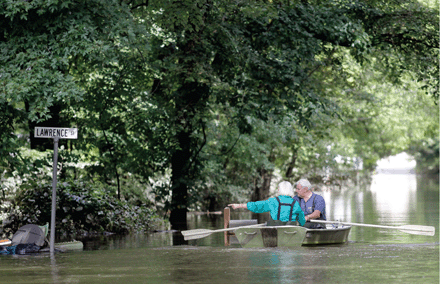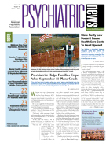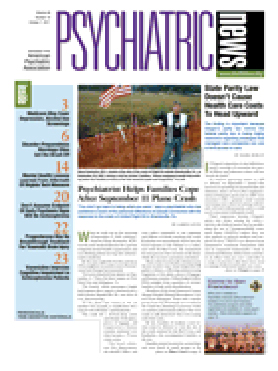Hurricane Irene struck New Jersey with so much rain that the Passaic and Hackensack rivers overflowed their banks, sending people in low-lying areas to Red Cross shelters.
Psychiatrists and other mental health professionals soon mobilized to work in the shelters. Among them was Joseph Napoli, M.D., a long-time member of APA's Committee on Psychiatric Dimensions of Disaster. He served at a regional Red Cross shelter in Paramus, set up at Bergen Community College.
"Waves of people came in, all very anxious, worried about the loss of their homes, wondering what would happen to their families, and fearful about the future," he said in an interview.
"We worked by listening empathically, connecting, calming, being an emotional anchor, validating their feelings about the disaster, all while addressing their practical needs," Napoli told Psychiatric News.
Volunteers nevertheless have to be careful about the messages they convey, he said.
"You can give information, but it has to be accurate," he said. "You never make promises and never raise false hopes."
When he encountered cases of patients already in treatment, he sought to call the patient's clinician when possible and made sure the patient could also make that connection when needed.
He also asked people he met in the shelter who were previously diagnosed with a psychiatric or other medical condition if they were taking any medications and if they had brought a supply with them when they left home.
With immediate medical issues addressed, he moved into problem-solving mode. For instance, a single mother with two children and living paycheck to paycheck lost everything in her home. In the shelter, she could be directed to social services, but Napoli also spent time with her asking how she had dealt with other crises in her life. Soon enough she came up with additional courses of action, drawn from her own experiences, to help herself out of her predicament.
"You have to look for a person's strengths," said Napoli. "Ask, 'Have you been through something like this before? How did you deal with that then?' You help people realize they have the strength to deal with it."
In another case, a handicapped woman who used a wheelchair was clearly in some psychological discomfort at the shelter. Napoli drove to her hometown and spoke to the emergency-management director there. He told Napoli the local evacuation order would soon be lifted and the woman could return home.
Most of the psychiatrists who responded after the flood had attended prior disaster-preparedness meetings and training events. Napoli worked with volunteers in the Paramus shelter whom he had already met at a training session earlier in August.
"It's important to have those connections in advance of a disaster," said Charles Ciolino, M.D., chair of the New Jersey Psychiatric Association's disaster preparedness committee.
The district branch encourages members to join existing disaster response organizations like the Red Cross, local emergency-management teams, or the New Jersey disaster-response crisis counselors.
So when emergency-management officials called Ciolino on the day the storm was at its peak, they already knew each other. Additional training to become certified as part of the crisis-counselor program had brought him into contact with other mental health professionals, creating the basis for a more effective working relationship after the hurricane.
Having that framework was critical to lessening the effects of the hurricane.
"Disaster is chaos," said Napoli. "Everybody's job is to change chaos back into structure and normalcy."


